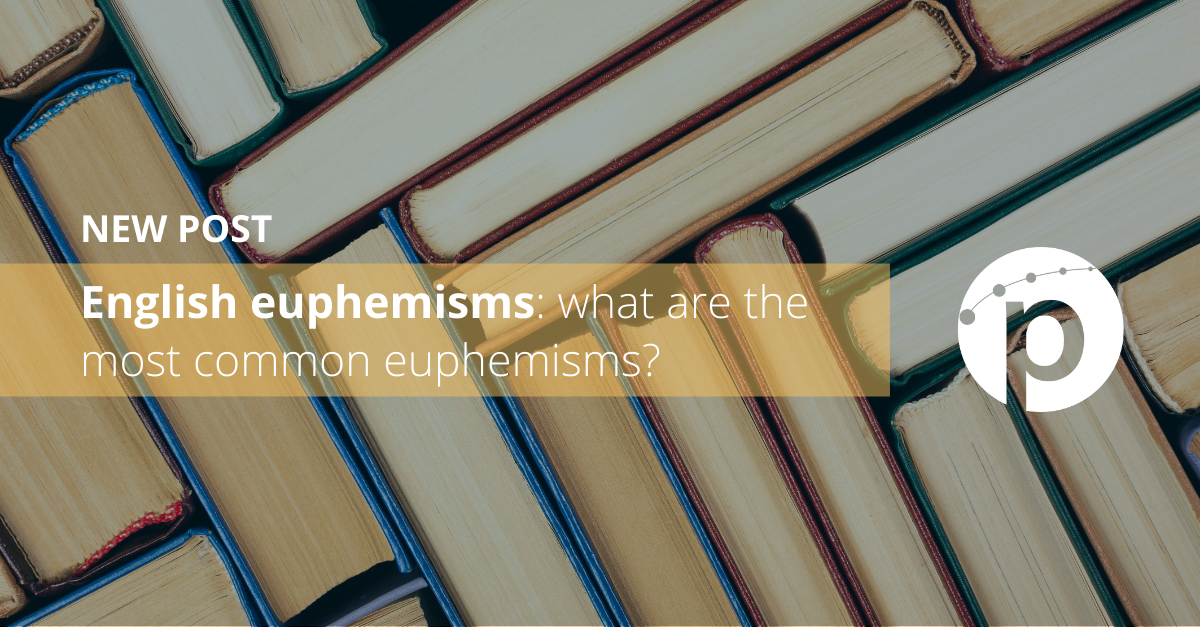
Common euphemisms in English normally concern religion, death or sex. Examples of these euphemisms are to sleep with instead of to have sexual intercourse with; departed for dead; and to relieve oneself for to urinate.
We can see from these examples that euphemisms bear the same meaning as their taboo equivalent without seeming crude or indecent. Understanding common euphemisms can enhance communication skills and promote effective interaction with others.
.png?width=699&name=Pangeanic%20-%20RRSS%20(56).png) Examples of euphemisms in English
Examples of euphemisms in English
What is a euphemism?
A euphemism is a polite word or expression used to substitute a more expressive or direct one to avoid being distasteful or offensive.
The importance of using common euphemisms in English
Euphemisms can be particularly useful when we are speaking about a subject that can create awkward moments with others and when dealing with children. They can be used to shelter children from adult subjects, to avoid hurting loved ones by being harsh, and to avoid politically incorrect wording in public. Additionally, they can also be employed to soften the impact of negative information, convey sensitivity or respect, or maintain social harmony. Polite sentences and political correctness are therefore both filled with euphemistic phrasings.Techniques for creating euphemisms in English
Not all euphemisms are created the same way. There are many different methods used in everyday life as well as other areas of life to soften a rude statement.
-
Abbreviations: such as B.O. for body odor and WC for water cycle.
-
Abstractions: such as before I go for before I die.
-
Longer/more scientific terms: flatulence for farting, perspiration for sweat, and mentally challenged for stupid.
Technical terms: such as gluteus maximus for backs
Keep Reading:
English euphemisms in literature
Below, we will analyze different examples of English euphemisms in the work of prominent writers that will help us understand their complexity and applications.
Example #1: Othello (By William Shakespeare)
Examples of euphemism referring to sex are found in William Shakespeare’s Othello. In Act 1, Scene 1, Iago tells Brabantio:
“I am one, sir, that comes to tell you your daughter and the Moor are now making the beast with two backs.”
Here, the expression making the beast with two backs refers to the act of having sex.
Example #2: Antony and Cleopatra (By William Shakespeare)
Similarly, we notice Shakespeare using euphemism for sexual intercourse in his play Antony and Cleopatra.” In Act 2, Scene 2, Agrippa says about Cleopatra:
“Royal wench! She made great Caesar lay his sword to bed. He plowed her, and she cropped.”
The word plowed refers to the act of sexual intercourse, and the word cropped is a euphemism for becoming pregnant.
Example #3: Lover Eternal (J.R. Ward)
"You are a manipulator." "I like to think of myself more as an outcome engineer."
In this excerpt, one of the brothers accuses the other of being manipulative, a word that surely has a negative connotation. Instead of taking offense, the other vampire laughs it off and says he's merely an outcome engineer. Very clever.
Conclusions
By using euphemisms in English, liars can be creative with the truth, women have buns in the oven and employees can be let go instead of fired. People can express themselves in a more respectful and polite way by being aware of these language options.
English euphemisms are the ultimate gateway to political correctness.



